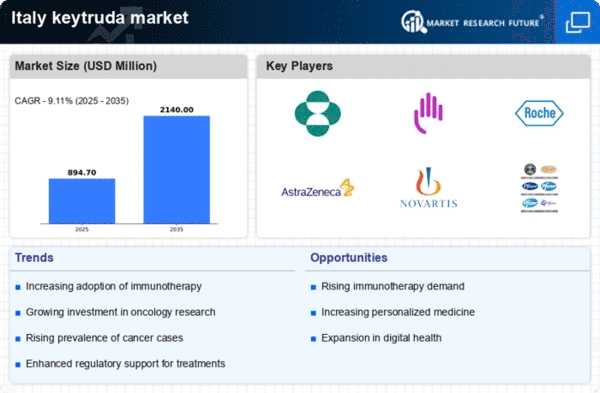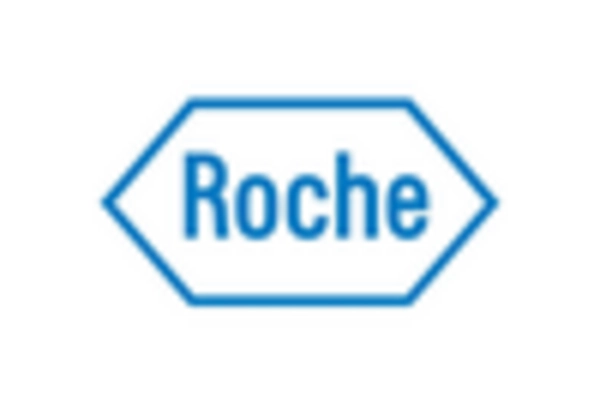Rising Cancer Incidence
The increasing incidence of cancer in Italy is a pivotal driver for the keytruda market. According to the Italian Association of Cancer Registries, cancer cases are projected to rise by approximately 1.5% annually. This trend necessitates the development and availability of effective treatments, such as Keytruda, which is an immune checkpoint inhibitor. The growing patient population seeking innovative therapies creates a robust demand for Keytruda, thereby propelling the market forward. Furthermore, the Italian healthcare system is adapting to these rising numbers by integrating advanced therapies into treatment protocols, which further supports the keytruda market. As healthcare providers aim to improve patient outcomes, the focus on immunotherapy options like Keytruda is likely to intensify, indicating a promising outlook for the market in the coming years.
Healthcare Policy Reforms
Recent healthcare policy reforms in Italy are shaping the landscape of the keytruda market. The Italian government has implemented policies aimed at improving access to innovative therapies, which includes streamlining the approval process for new drugs. These reforms are designed to enhance patient access to cutting-edge treatments, thereby increasing the uptake of Keytruda among oncologists and patients. Additionally, the introduction of value-based pricing models is likely to incentivize the use of effective therapies, further driving the market. As healthcare policies evolve to prioritize patient outcomes and cost-effectiveness, the keytruda market stands to benefit from a more favorable regulatory environment. This alignment between policy and market needs may lead to increased adoption of immunotherapies, positioning Keytruda as a key player in the treatment of various cancers.
Investment in Research and Development
Investment in research and development (R&D) within the Italian pharmaceutical sector is a significant driver for the keytruda market. The Italian government has been actively promoting R&D initiatives, with funding allocations increasing by around 10% over the past few years. This financial support encourages pharmaceutical companies to innovate and develop new therapies, including immunotherapies like Keytruda. As a result, the market is likely to witness a surge in clinical trials and new product launches, enhancing the competitive landscape. Moreover, collaborations between academic institutions and industry players are fostering advancements in cancer treatment, which could lead to improved efficacy and safety profiles for Keytruda. This dynamic environment suggests a favorable trajectory for the keytruda market as new research findings translate into clinical applications.
Growing Demand for Personalized Medicine
The shift towards personalized medicine in Italy is a crucial driver for the keytruda market. As healthcare providers increasingly recognize the importance of tailoring treatments to individual patient profiles, the demand for targeted therapies like Keytruda is expected to rise. This trend is supported by advancements in genomic testing and biomarker identification, which enable clinicians to select the most appropriate therapies for their patients. The Italian healthcare system is gradually adopting these personalized approaches, which may enhance treatment efficacy and patient satisfaction. Consequently, the keytruda market is likely to experience growth as more patients are identified as suitable candidates for immunotherapy. This focus on personalized treatment strategies aligns with broader trends in oncology, suggesting a promising future for Keytruda in the Italian market.
Increased Collaboration Among Stakeholders
Increased collaboration among stakeholders in the Italian healthcare ecosystem is emerging as a vital driver for the keytruda market. Pharmaceutical companies, healthcare providers, and patient advocacy groups are working together to enhance awareness and accessibility of innovative therapies. This collaborative approach is fostering a more informed patient population, which is crucial for the adoption of treatments like Keytruda. Additionally, partnerships between industry and academia are facilitating research initiatives that aim to improve treatment protocols and patient outcomes. As these collaborations strengthen, they are likely to create a more supportive environment for the keytruda market, encouraging the integration of immunotherapy into standard cancer care. This synergy among stakeholders may ultimately lead to increased utilization of Keytruda, reflecting a collective commitment to advancing cancer treatment in Italy.
















